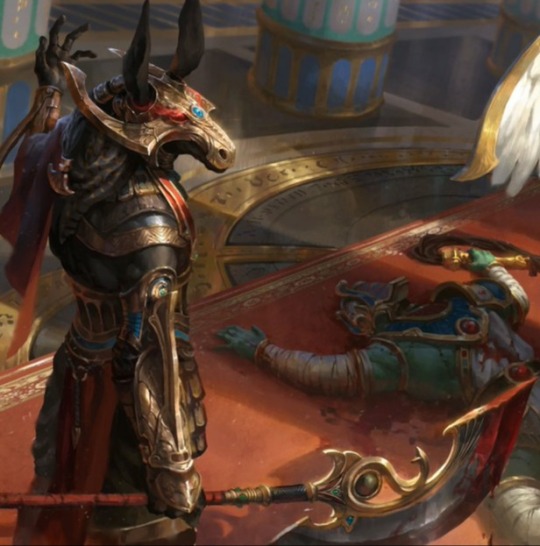#he can be trapped in a prison world with his wife gaining redemption in one alt universe
Explore tagged Tumblr posts
Text
rook and solas in the 'bad' ending...much to think about
#thoroughly enjoying the 'best' ending that i chose#but also solas has two hands#he can be trapped in a prison world with his wife gaining redemption in one alt universe#and also be trapped with his narrative mirror who bested him and doomed them both in another#solrook#solas x rook#solas#dragon age spoilers#dragon age veilguard spoilers#dragon age#'bad ending' core
135 notes
·
View notes
Text






#solas#dragon age#dragon age veilguard#veilguard spoilers#video games#bioware#dragon age veilguard spoilers#dav spoilers#rook#solas x rook but it is solavellan#kinda ua#WHATEVER#he can be trapped in a prison world with his wife gaining redemption in one alt universe#and also be trapped with his narrative mirror who bested him and doomed them both in another
46 notes
·
View notes
Text









Character Analysis, Choi San- the 'Usurper'
Languages: English, Arabic (Post Transformation), Japanese (Modern Day), Korean (Modern Day), French (Modern Day)
Crew Position: Sailing Master + Navigator +Map Maker
Powers: Blood Manipulation (Inherited by Egyptian God, Set)
Compass Position + Arrowpoint Stone: Northwest, located on his left pectoral (mirrors Wooyoung’s), Pigeon Blood Ruby
Eye Color: Brown(Natural)/ Heterochromatic Pink Right Eye, Lime Green Left Eye (Demonic Form)
Hair Color: Dark Brunette (Both Forms)
Likes: His space, Sitting in the Crow’s Nest, Drawing Maps, Weapons, Talking Shit
Dislikes: His family, Letting Too Many People Close to Him or Wooyoung, Mirrors, His Own Reflection
*The above artist rendition of Set is used courtesy of the game, Smite
Oldest Son, Choi San.
Born the one and only son of a family of four, somehow didn’t gain him enough of his family’s respect-or love-growing up. San is actually the child of two aristocratic parents, something that clashed with his personal desire to be his own person. Rebelling for as long as he could walk, San grew to resent the tightening noose around his neck from his family and began running away more frequently from his family.
They couldn’t even remember his own birthday, and he couldn’t be bothered to remember theirs. When the opportunity arose and he was forced aboard a pirate ship, the small voice on his shoulder told him as the shackles were placed onto his wrists and ankles, that he’d never see them again.
San couldn’t help the quirk of his lips at the thought.
Sailing Master Choi San
Suppressing his aristocratic side has never been so easy. Though standoffish at first, San has had the opportunity to prove himself as a new, useful man. For once, he finally understands what a ‘family’ is and how it feels to be ‘loved’. Wooyoung was the first to make him feel like more than a burden on the people around him, and to this day, while he loves all of the members and his lovers in his own way, Wooyoung will always be his first love and one of the first ones he’ll ever turn to when he’s in trouble.
With a pencil in hand and the sea breeze blowing his bangs, San can finally draw his own future and feel peace knowing he is loved by those around him.
-Mythology-
Set, also known as Seth, is the Egyptian God of the desert, storms, chaos, and violence. Depictions and understandings of them vary depending on who’s drawing, writing, or viewing him, but he has been represented as a male figure with a humanoid body and an animal head like many other Egyptian gods and goddesses were. Such animals he has been depicted as include several canines, including jackals, fennecs, and greyhounds. He has also been depicted as having a donkey, okapi, aardvark, antelope, or oryx’s face, instead. The inconsistency of his figure in Egyptian depictions is also believed to stem from Set himself being more like a chimeric being who changes his forms.
Set, like many other Egyptian gods, can change his forms into several animals, and also has a form to mimic the appearance of the god Anubis.
A destructive force of nature and often regarded as a trickster, Set was credited for creating natural disasters such as sudden, flash flooding, sandstorms, and thunderstorms. He is considered to be one of the mightiest of the Egyptian gods.
Egyptian familial trees are often complex and overlap, but some depictions of him and his family, Geb and Nut are his parents, with Osiris, Horus, Isis, and Nephthys being his siblings and Ra being his grandfather. In other depictions, Horus and Anubis are his nephews and in some, Anubis is his illegitimate child after disguising himself as Osiris and courting Isis.
One of the driving factors of many of Set’s tales is his burning jealousy and rage, especially towards his brother Osiris.
Set was apparently the only of his siblings that didn’t have a traditional birth. Some say he tore himself from his mother’s womb, others say she spat him into existence and this was believed to foretell his existence of a being of chaos and disorder.
At one point, his brother Osiris, known to be a benevolent king that brought positive changes to the lands he ruled and graced, left out of his kingdom’s reach to help in other areas of the world, and as such, appointed his wife Isis to rule the lands in his stead.
While he was away, Set would set into motion the of the largest scaled affair in all of Egyptian mythology, an event that included many of the Pantheon’s major players in some way shape or form.
After conspiring against him with several others, Set would end up trapping and murdering Osiris. Not content with simply killing him, Set eventually tears Osiris to pieces, tossing his remains all across Egypt in another attempt to keep him from ever being whole again. Isis managed to find all of the pieces of her husband despite Set’s efforts. Well, most of the pieces.
She never located his dick, so that’s fun. She replaced it with a golden one, though! Yay innovation!
Through the use of magic, Isis managed to revive Osiris, though he would never rule in his original kingdom ever again, and would instead be in the Underworld.
Set tried several times to steal Osiris’ body from the underworld, and each time was punished severely for his intrusion by the jackal-headed god of the dead, Anubis. Eventually, after repeated attempts, Anubis grew tired of the chaotic desert god and killed Set once and for all.
Despite his chaotic and volatile actions, Set did have moments of redemption. In the afterlife, Set protected the great Sun God, Ra, from the serpent Apophis as Ra embarked on his daily journey through the Underworld. Set placed himself in front of Ra’s barque and would attack and kill Apophis every time he would rise to attack Ra. The serpent could be killed, but would rise again the very next day.
Set would be there to slay it night after night, thus granting Ra safe passage and being one of the reasons the sun rises each day.
-Power Applications/Demon Transformation-
As Set is one of the more violent of the gods that the boys have inherited their powers from, San’s fighting style has remained just as violent and wild. When he is fully imbued with the effects of his powers, his eyes go bright pink and lime green. His lips turn into an onyx color and runes appear across his face, from his forehead, all the way to his chin.
San’s blood manipulation allows him to turn any blood around him into a weapon, be it a series of daggers to propel through the air, or his go-to favorites, a large spear or scythe for attacking. Despite his aristocratic upbringing, San is incredibly good at hand to hand combat and isn’t afraid to fight ’dirty’. He’s only gotten more proficient at fighting without his powers thanks to Yunho taking the time to teach him capoeira.
San’s runes only appear when he begins using his blood manipulation, and he prefers to use other people's blood, as too much blood loss from himself may still make him pass out and leave him prone in battle. He also has a few light blades weapons from Wooyoung he uses when there hasn't been any bloodshed on the battlefield yet, but if push comes to shove, he's not opposed to asking the slightly younger immortal to cut into him.
-Character Song Breakdown-
All of the main boys have a song assigned to them in the AtT playlist to go alongside their origin chapters. San's song, which he shares with Wooyoung, is Mist by Ateez. I will go over some spoiler things, but if you made it this far, you may know this already.
Mist is used as an in-story device that goes over Wooyoung and San’s budding relationship and them coping with the uncertainty of life while being prisoners aboard a slave ship.
-If I can’t see anything
If I can feel you, I’m fine
I want you to make me sure
I need you to help me out of my misery
I can see the light in the dark,
It quickly blurs
Step back in place.-
San spends the majority of his life feeling isolated and alone. He had no friends, as his mother’s aristocratic status left him with limited options for people he could make friends with. His sisters resented him as much as he did the entirety of his family, and he usually kept to himself. His general dislike and distrust for those around him persist until he meets Wooyoung, and it’s through the other boy’s positive outlook on life that San slowly begins to understand that not everyone in the world is out to get him.
- Lost and wandering hands again
Hold me and hug me
Your whisper is my compass
Even if we’re going back for a long time
Stay with me, always
I’m not sure. I don’t know the way
I’m just Like Alley Cat without you....-
San doesn’t know what it means to love, be it platonic or otherwise until he meets Wooyoung. He has a disposition much like that of a feral and volatile alley cat due to what he went through all through life, but it’s through Wooyoung-and eventually Hongjoong and the crew-that he’s guided towards the more positive aspects of life.
They soon become his new moral compass.
-Character Blurb-
“You’re just like the other pirates. I won’t let you take away the only person that’s ever loved me.”
San’s eyes grew as he watched his body move against his own will. The runes on his face gleamed and pulsed with chaotic energy as he attacked Seonghwa and Hongjoong, laughing maniacally and screaming about them giving Wooyoung back. Across from him, two eyes gleamed in the darkness.
He stepped away, his foot sinking into the sand that was below his feet.
A snort came from the figure, as he approached, his blade dragging through the sand.
“Long lives those who are strong. How strong are you, cowering under something as fruitless as ‘love’? I choose you because you are full of rage, you have all I need to take back this world and get my revenge. Give in, it’ll all be over soon.”
“San!”
San looked behind him, eyes wide as he saw Wooyoung. No, he had to get out of there, he couldn’t-
“It’ll all be over soon.” The figure repeated, and in a gush of sand and wind, he saw his body fly forward and a blade of blood sliced into Yunho. San screamed inside his head as the dark figure controlled his body, eyes gleaming in malice as he raised a blood sword.
“Rid yourself of such fruitless emotions and useless people. Let it all wash away in the sand and blood. I’ll do you this one favor. Then, this body will be mine.”
“So please,
If this is my way
Hold my hand
So we won’t wander for much longer…”
The sound of Wooyoung’s voice finally spurred San to action and he sprinted forward before the large being could kill Yunho. He snatched a small blade from his hip and buried it into his back with a scream. Blood splattered onto his cheek and the large man tossed him aside, pink and green eyes turning on him as he broke into a run towards San, a scream of rage and pain rattling in the sandy area inside San’s mind.
San threw his hands up, and the blood from the being’s wounds sharpened, impaling him from all sides before his claws could slice into San’s face.
His hand trembled as he let out a growl.
“No! Not...Not again…!”
San stood, feeling himself regaining control as the dark dessert began to fade away from his vision. Before he completely regained his senses, he looked back at the dying entity, his lips pressed into a firm frown and his fists clenched.
“I’m my own person. I have no strings on me. Not anymore.”
-M.List-
28 notes
·
View notes
Link
FAIRY TALES ARE REALLY JUST HARD-BOILED CRIME STORIESExploring the Dark, Twisted World of Classic Fairy Tales - Steph Post
Source https://crimereads.com/fairy-tales-are-really-just-hard-boiled-crime-stories/?
Bad things happen in fairy tales. To good people. To bad people. To dragons and witches and princesses and bastard children. Usually they end with a happily ever after—the guy gets the girl or the girl gets revenge, the kingdom awakens, the peasants aren’t eaten but can go on with their miserable peasant lives—but to get that happy ending, a crime must be committed first. Epic betrayals, such as adultery and infanticide, but minor crimes too. Trespassing and petty theft and disorderly conduct. And then there are the exotic ones, the cases of bestiality and necrophilia and the like.
Modern crime fiction has nothing on the ingenuity, brutality and sheer bizarreness of the offenses committed in classic fairy tales. Moreover, fairy tales are ruthless. Our contemporary crime novels have the monopoly on moral ambiguity, true, but fairy tales take no prisoners and often offer no redemption. Mercy is not a hallmark of the genre and even the kindest, most benevolent maid-turned-princess isn’t afraid to take out her wicked stepmother.
Strip away the fairy godmothers and the helpful goblins, the magic trees and the singing bones, and you’re left with an array of hardboiled crimes straight out of Chandler or Highsmith, Christie or Connelly, and everyone in-between. Here are a few of my favorites, from fairy tales across the globe.
“Daughter Kills Family with Flaming Skull, Gets No Jail Time”
I’ve recently discovered Slavic folk and fairy tales and have become obsessed with the stories of Baba Yaga. One of the most popular is the tale of Vasilisa the Beautiful. In true fairy tale fashion, Vasilisa is gorgeous, industrious, and the bane of her stepmother’s and sister’s existence. They try to snuff her out by sending her to Baba Yaga, the witch in the woods, for a light. Vasilisa is so perfect, however, that Baba Yaga can’t stand her and instead of gobbling her up, sends her back home with a skull full of fire. When Vasilisa hands over the light her stepmother requested, it burns her alive. And her stepsisters. And destroys the house as well. Vasilisa, though, like Daenerys Targaryen emerging with her dragons, comes through unscathed and eventually snags a king for a husband.
“Lost Children Murder Old Woman by Baking Her Alive”
This would be, of course, the tale of Hansel and Gretel from the Brothers Grimm collection. This story has everything—an evil stepmother, forced marching, greedy kids lost in the woods, an edible house, and a not-so-bright witch who meets her demise in the end. Women often get a bad rap when it comes to fairy tales; they’re thought of as passive, prizes to be won, and sometimes they are. But unmarried girls, however, have a surprising amount of agency. They survive by their wits, and Hansel and Gretel is a perfect example of the cunning of girls in fairy tales. While Hansel is kept in a pen, fattening up for the witch’s supper, Gretel manages to trick the witch into getting inside her own oven, where she is promptly burnt to a crisp. Gretel saves the day and gets a candy house to boot.
“Princess Cheated of Husband Uses Dead Horse to Get Revenge on Rivals
It would be tough to pick a favorite Grimm’s fairy tale, considering there are over two hundred to choose from, but if you held my feet to the fire, I’d have to choose The Goose Girl. It’s both morbid and terrifyingly strange, and definitely not suited for children. Self-mutilation, prophesizing drops of blood, decapitated horses and medieval forms of torture are rife from start to finish. It’s a meandering tale, but in essence it follows the trials of a princess who is forced by her chambermaid to switch places with her on the way to her wedding. The king is deceived and the true princess winds up herding geese and talking to the mounted head of her dead horse who, incidentally, talks back and eventually spills the beans on the chambermaid’s gold-digging scheme. The king then tricks his false bride into choosing her own punishment—being stripped naked, shoved in a barrel studded with nails and rolled down a hill—as the real princess takes her rightful place and becomes queen of all the realm. If that’s not a tabloid story fit for a crime novel, I don’t what is
“GAMBLING ADDICT PARTICIPATES IN CHILD-KIDNAPPING RING WITH TERRIFYING GIANT”
In Nepalese legend, Gurumapa is a hideous, fanged giant who collects children who have disobeyed their parents. In the story of Kesh Chandra, we have an old man who is cast out of his sister’s house after he can’t stop gambling, going so far as to steal her flatware to sell and feed his habit. He wanders Kathmandu for a while until some pigeons take pity on him and turn their own shit into gold. Being messy birds, there is a lot of gold and Kesh, being a greedy man, had to have it all. He persuades Gurumapa, a fierce, man-eating giant who just happens to be wandering around nearby, to carry all the gold for him by promising to throw him a feast. Kesh Chandra also tells the giant that he has permission to kidnap any disobedient children in the area. Our gambling addict is taken in by Gurumapa and allowed to live in the giant’s attic, so long as he placates the village parents when the children stop coming home from school. It’s a match made in heaven and the two get on splendidly—Kesh enjoying his gold and gambling and Gurumapa enjoying his children.
“MOTHER COMMITS SUICIDE AFTER STEPDAUGHTER IS BLESSED BY TALKING HEADS, DISAPPOINTED IN OFFSPRING”
Death by suicide is the only real crime in the bizarre tale of The Three Heads of the Well, but in our current area of overly-ambitious stage parents, I think it’s both apt and deliciously strange. As expected, you’ve got a king, a stepmother, a stepdaughter and, of course, a mother-less daughter who goes out into the world to seek her fortune away from her bratty new family. An old man she is kind to repays the favor by telling her to visit a well where three heads—yep—are hanging out, waiting for someone to wash them and comb their hair. Upon doing so, they grant her the gifts of being beautiful, having a wonderful voice and becoming a queen. When she leaves the well she just so happens to run into a king who is charmed by her beauty and her voice and immediately marries her. Now, the stepmother, upon hearing this, sends out her own daughter, determined that she should make an even better match. This girl, however, is rude to the old man and the three heads and they blight her with leprosy, a terrible voice and a marriage to a mere cobbler. The jealous stepmother, however, is so mortified by her daughter’s humble marriage that she goes insane and eventually hangs herself. The story ends with the king celebrating the death of his wife and the ugliness of his stepdaughter. Yikes.
“MAN STEALS DUCK, SPROUTS FEATHER, TURNS MASOCHIST”
This strange tale hails from China and, while short, hinges on a simple crime. In Theft of a Duck, a man does just that—steals a duck from a farmer. The following morning, he wakes to discover that he has grown feathers all over his body in the night. They itch terribly but the next night the thief dreams that he will be granted relief if he returns to the farmer and the farmer calls him what he is, “a dirty thief.” The next day the thief goes to the farmer and tries to trick him into calling a neighbor a dirty thief, so the words will be spoken. The trick fails, as the farmer refuses to be so mean. Finally, desperate, the thief rips open his shirt to display his feathers and begs the farmer to call him a dirty thief. The farmer, being a good man, takes pity on the thief and berates him until his feathers disappear.
“PATHOLOGICAL LIAR BETRAYS FATHER, BECOMES VICTIM OF HUMAN TRAFFICKING AND IS FALSELY PRESUMED DEAD”
Pinocchio. I’m not sure which Disney film was more disturbing to me as child—Pinocchio or Dumbo. I think I’ve blocked much of the Disney version out, but in reading the original serialized novel as an adult, I’ve realized just how disturbing this Italian fairy tale actually is. We all know the basics from the cartoon: the wooden puppet, his kind father, the blue fairy and Jiminy Cricket, wishing upon a star. But then you’ve got Pinocchio compulsively telling lies, killing his helpful cricket-sprit-guide, running away from home, being tricked and trapped into a grotesque puppet show on a ‘pleasure island,’ being swallowed by a whale, discovering his whale-swallowed father, dying and then being brought back to life as a human boy. And that’s the Disney version! In the original, Pinocchio is even more of a jackass (reference intended) than he is in the film. Our cruel puppet not only lies, cheats and swindles, but mutilates animals, physically abuses Geppeto, and is an all-around jerk, even as everyone continues to give him second chances. Pinocchio is the ultimate conman—faking his death, playing up his ‘puppet angle’ to gain sympathy and indulging in every possible vice from drinking to gambling to ogling other puppets. In short, Pinocchio is a hotbed of crimes and sin. Especially as, in the end, Pinocchio gets away with it all.
***
And then you’ve got Snow White (rape), Rapunzel (false imprisonment), Briar Rose/Sleeping Beauty(breaking and entering), Fitcher’s Bird/Bluebeard(serial killing), Little Red Cap/Red Riding Hood(animal abuse), The Robber Bridegroom, (cannibalism) and The Juniper Tree (child abuse)—and that’s just circling back around to the Grimm Brothers. Crime writers, if you ever need inspiration for a plot, you need look no further than the fairy tales we all grew up on. All the crimes you could ever want are there—right up to the happily ever after.
#fairy tales#fairy tale#grimm brothers#brothers grimm#pinocchio#hansel and gretel#the three heads of the well#theft of the duck#kesh chandra#the goose girl#baba yaga#crime fiction#snow white#rapunzel#sleeping beauty
0 notes
Text
AG 026 The Escape Artist
http://www.alainguillot.com/the-escape-artist/
Bernie, The Escape Artist, is a blogger based in England.
The name of the blog came from the classic movie The Grand Escape which plays every Christmas in England.
His blog is about helping people get out of the financial prison camp in which many of us end up.
If you are working on a job you don’t like or if you are in debt, you are in a prison-like situation.
Breaking out of prison requires slow deliberate work which can have a huge payoff.
Although not poor, during his childhood Bernie developed some anxiety about money. His parents bought the biggest house they could afford. Shortly after the purchase interest rates went up in England to 17%. This series of events put Bernie’s parents under a lot of stress.
Bernie decided he didn’t want that kind of life for himself, he chose a career which would pay him well and he decided not to climb escalator of lifestyle inflation.
He tried to get a job as an investment banker, but because he wasn’t able to find a job in that field, he went into accounting. Bernie wanted to send signals to his future employer that he was serious about earning money.
Bernie’s view on education is that education is an investment and he wanted a return for his money. Not to be critical, but some careers don’t offer many job opportunities, the return on investment is minimal and they can be considered a 3 year study holiday.
Education in England, as in Canada, is partly subsidized by the government. Students don’t go into massive student debt to get an education. In the United States, some students can be harmed for the rest of their lives with the huge student debt they incur.
After graduation, Bernie decided to live in a low-income neighborhood as opposed to a higher level neighborhood that he could afford.
In addition, Bernie walked or cycled to work to save money. According to Bernie, cars are money incinerating units. People living in big cities don’t need a car. Having a car can be a big hurdle in the journey to financial freedom.
The best way to get around in London is by bicycle, and you get the added benefit of getting in better shape.
Bernie climbed the professional ladder, he worked in mergers and acquisitions, and he got paid to learn how to value stocks.
He started applying the lessons he learned at work in his personal life.
If people would apply the same amount of care and attention to their personal finance as they do to the work they do for their employer, everyone would be much better physically, emotionally, and financially.
Bernie himself gave his best energy, time, mental focus to his employer, but he had a plan. He was slowly putting some money away. He knew he would not be in his job forever, so he wanted to give his best and he wanted to take out the most.
Money is power. The money that you hang on to, it gives you freedom, it gives you choices.
When Bernie was about 32 years old his wife got pregnant with their second child. It was a family decision that she would stay at home to take care of the kids and Bernie was the sole breadwinner. At this same time, he started working at a job he hated. At this moment he felt in prison, in prison because of the added responsibility of a new child while not having another job option at the moment.
The initial plan was to slash the spending to the minimum. Finally, Bernie found another job in which he was feeling better, but he continued saving because once he cut down on spending money, he realized he didn’t miss any of the stuff he cut off from his regular spending. The more he saved, the more his scape fund grew and the more felt he was on the path of financial security.
At that time, the concept of financial independence was not a common concept. This was before Mr. Money Mustache, before Early Retirement Extreme, so Bernie was exploring new territory with no guidance from anyone else.
Some of the unnecessary spending that Bernie eliminated was: restaurants, shopping, buying stuff, going out on mini-breaks like going to Rome or Vienna, Prague.
There was a bit of resistance on the part of Bernie’s wife when faced with big cutbacks, but also there was the understanding that working long hours, indefinitely was not the solution either.
One of the challenges to cutting back was the social factor. Their friends continued spending as always, so Bernie and his wife had to mentally disconnect in order to stick to the plan. In prison talk, their friends were institutionalized.
A book recommendation to deal with what other people may think about you is: Not Caring What Other People Think is a Superpower.
As far as investments, Bernie learned to like steady Eddy, boring companies. On the other hand, glamour and excitement are traps. So investing is partly quantitative, but it’s mainly about controlling your emotions, it’s about not getting carried away, it’s about NOT falling in love with a particular stock, it’s realizing that you want to play the percentages and you don’t want to strike out. The biggest lesson was that the less exciting a stock was, the better.
Bernie’s portfolio is 80% stocks, 20% bonds. The stock part is 50% individual stocks and the other 50% is index funds.
We spoke about the home bias tendency in investing (the tendency for investors to invest a large percentage of their money in domestic equities) and how the Vanguard All Word Index may be a good solution to solve the home bias.
Having his savings, earnings, and investing in place, it was time to make a move, to go for financial independence. There were several blogs which served as inspiration, some of those blogs where: Monevator, Mr. Money Mustache, J.L. Collins, and The Mad Fientist Podcast. After reading about the 4% rule, Bernie did some calculations and discovered that he had enough to retire.
After a conversation with his wife, the only step left was to wait 4 months, until his last bonus was paid off. Ironically, after Bernie gave his notice of resignation he was asked to stay a bit longer as an independent contractor. The transition from employee to financially independent was slow and smooth.
We spoke about The Count of Monte Cristo, who was a prisoner for many years until he made his escape. It’s not just about the scape, but it’s a journey of self-improvement and knowledge. The Count of Monte Christo represents many of the themes evoked in financial independence.
When Bernie gave notice that he would be leaving his job, he noticed that the power dynamic of employer vs. employee had shifted. No longer was the employer the party with most of the power. Now he, the employee, had as much power as the employer. They were dealing as equals, both parties working to achieve a common goal. Unlike the regular employer-employee relationship where one party is dependent on the other for subsistence.
Being smart with your money doesn’t have to be about early retirement. Financial independence is about giving yourself choices.
We spoke about the movie The Shawshank Redemption, where one of the prisoners is so institutionalized that he has a hard time dealing with life in the free world. Having enough money is not enough for financial independence, you must have enough mental fortitude to walk out even when the gates are open.
We spoke about the books that shaped Bernie’s thinking about financial independence before and after the breakout.
Final thoughts:
The idea of aggregation of marginal gains. Everything is optimized to achieve a particular objective, and it’s the aggregation of all those little details that create the big change, the successful execution of the goal.
The Principles of Life Hacking. Read the blog post right here.
Check out this episode!
0 notes